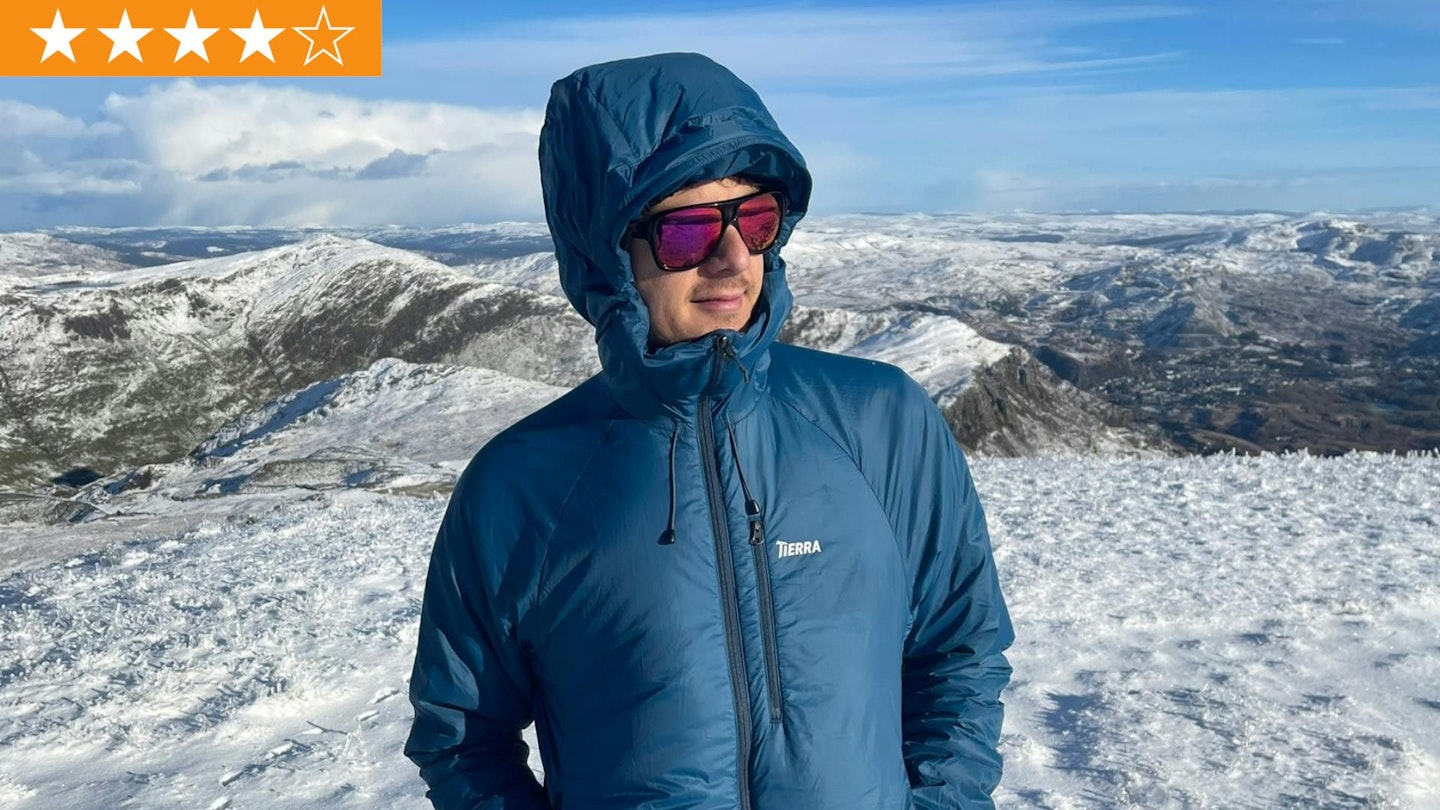Hailing from Sweden, the Tierra Belay 120 Jacket is equally suited for windy hillwalking and cold-weather climbing.
Instead of synthetic fill, it uses sheep’s wool – a renewable, recyclable and biodegradable material that offers a sustainable alternative to down. Wool is also more affordable, raises fewer animal welfare concerns and is less likely to cause allergies than down feathers.
Performance-wise, it excels in damp conditions, retaining insulation even when absorbing up to 36% of its weight in moisture.
The jacket is well-crafted and has many useful features, which include fleece-lined pockets, elastic cuffs and an adjustable hood, which is always appreciated.
Its lightweight, water-repellent ripstop nylon shell (made from 100% recycled materials) isn’t ultra-durable but benefits from minimal stitching, reducing the risk of snags compared to baffled designs. Now, let's get into some more details.
Pros
- Practical
- Decently warm
- Well-priced
Cons
- Not the best warmth for weight
- Zip tends to snag
| RRP | £210 / $267.70 |
| Womens sizes | XXS-XL |
| Weight | 515g / 1lb 2oz (men’s large) |
| Materials | Polyamide Ripstop Weave with PFC Free DWR (100% recycled, Bluesign-approved and GRS certified), 120gsm Lavalan Swedish Wool (80% wool, 20% PLA) |
| Men sizes | S-XXL |
Design and features
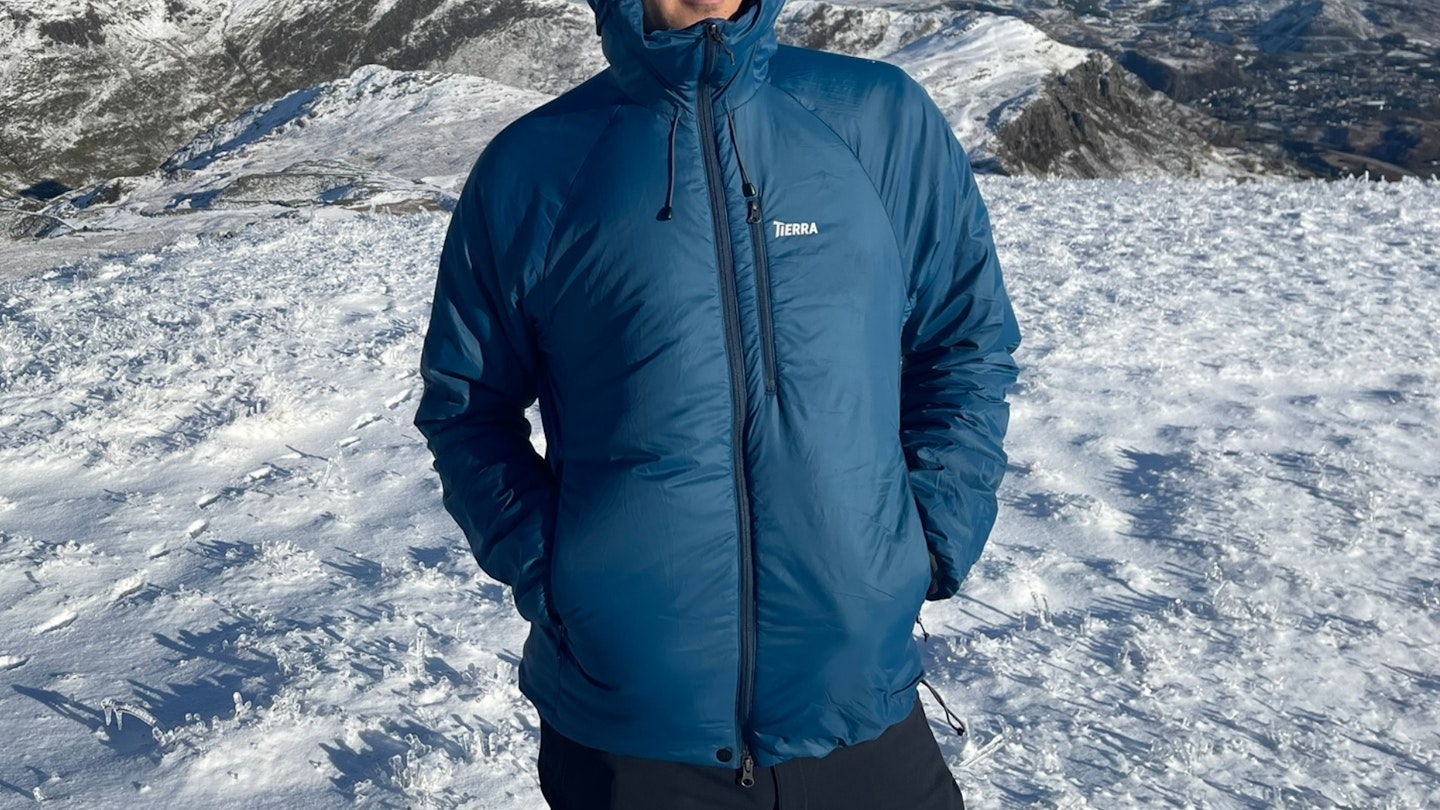
At first glance, this looks like a fairly standard midweight belay jacket. The design is simple and effective, consisting of block insulation wrapped in a lightweight nylon shell. It’s a tried and tested approach that works just as well for wild and windy hillwalking as it does for cold weather climbing – but there’s more to it than meets the eye.
Why’s that? Because the fill isn’t a man-made synthetic fibre like most belay jackets, but natural wool. This has many benefits, particularly in terms of sustainability.
In recent years, outdoor consumers have become rightly concerned about the impacts of microplastics leaching into the environment and into water systems, both through wearing synthetic garments in the great outdoors but especially through washing them.
Arguably, this might be less of a concern with jackets compared to baselayer tops or fleece midlayers, which tend to get stinky more quickly, as they sit closer to the body in a standard layering system – but it’s still a contributor to an increasingly worrying problem. Using natural wool instead of polyester seems to present an interesting potential solution.
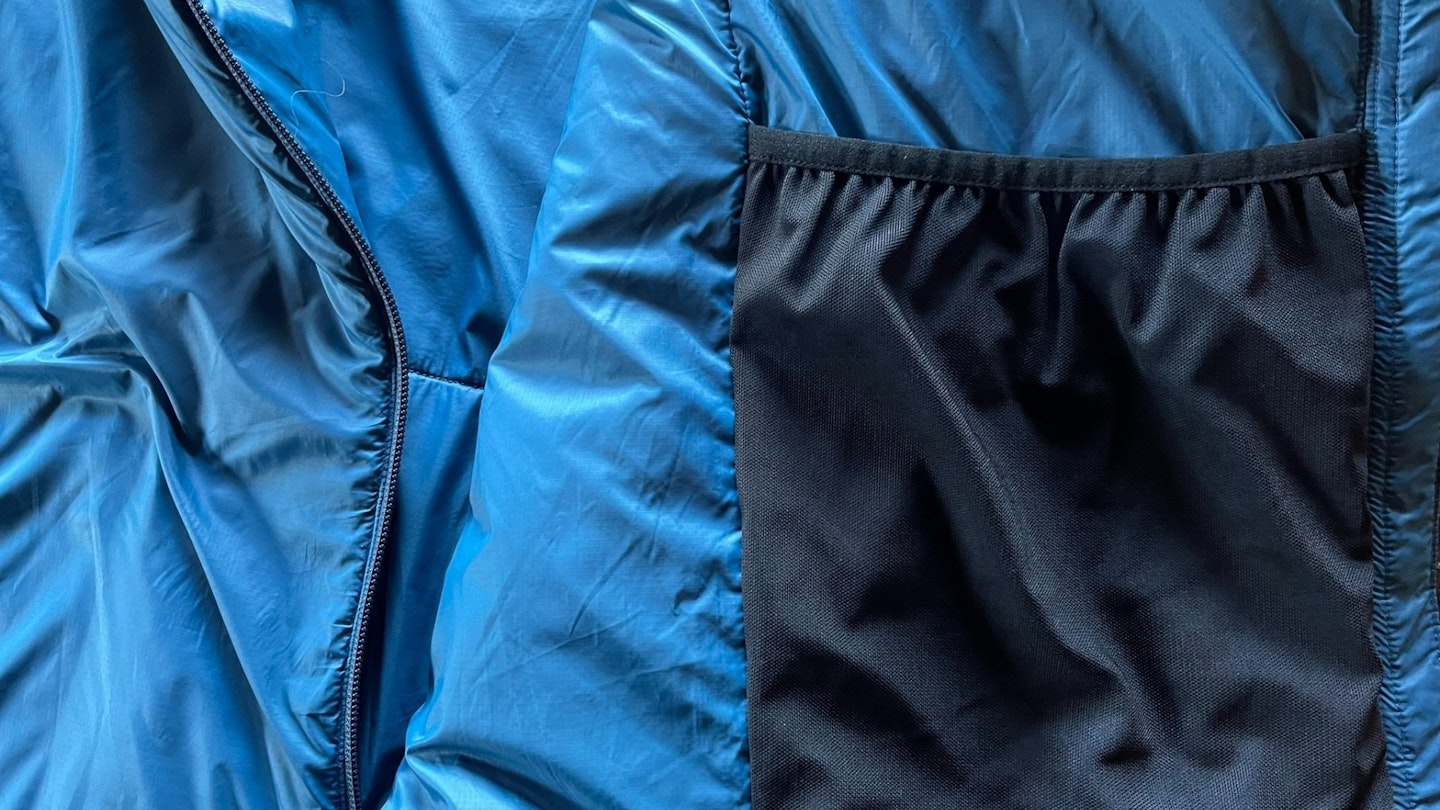
Of course, goose or duck down is another natural product that is a superior insulator, but it is expensive, comes with more ethical concerns around animal welfare and is also a more common allergen than wool.
In performance terms, it is also more susceptible to damp, whereas wool can absorb up to 36% of its own weight in moisture without feeling clammy (or losing its crimp, which, like down’s loft, is how it traps air to keep you warm).
Aside from its unusual but intriguing fill, this is a well-made and fully featured jacket for general outdoor use. It’s intended as an overlayer, so it has a slightly oversized fit that can be worn over everything else you’re wearing on the hill. It has a fully adjustable hood that will fit over a climbing helmet if needed, but also cinches in over a bare head or a beanie.
The main zip has a practical two-way zipper that can be opened from the top or the bottom, plus a microfibre fleece chin guard and a bottom press stud to prevent zip creep. There’s also a storm flap behind the zipper, though sadly it isn’t stiffened, so it has a tendency to snag occasionally (especially if you’ve got anything in the pockets, which weighs the fabric down).
There are dual hem drawcords too, though these aren’t a split tether design, so be careful not to get anything caught in them. The elastic-bound cuffs are fairly close-fitting, while the zippered hand pockets feel extremely cosy, thanks to a soft fleece lining.
Inside the jacket there’s also a big stretch mesh pocket for stashing gloves or mitts, while outside there’s a smaller zipped pocket at the chest.
Fabrics and fill
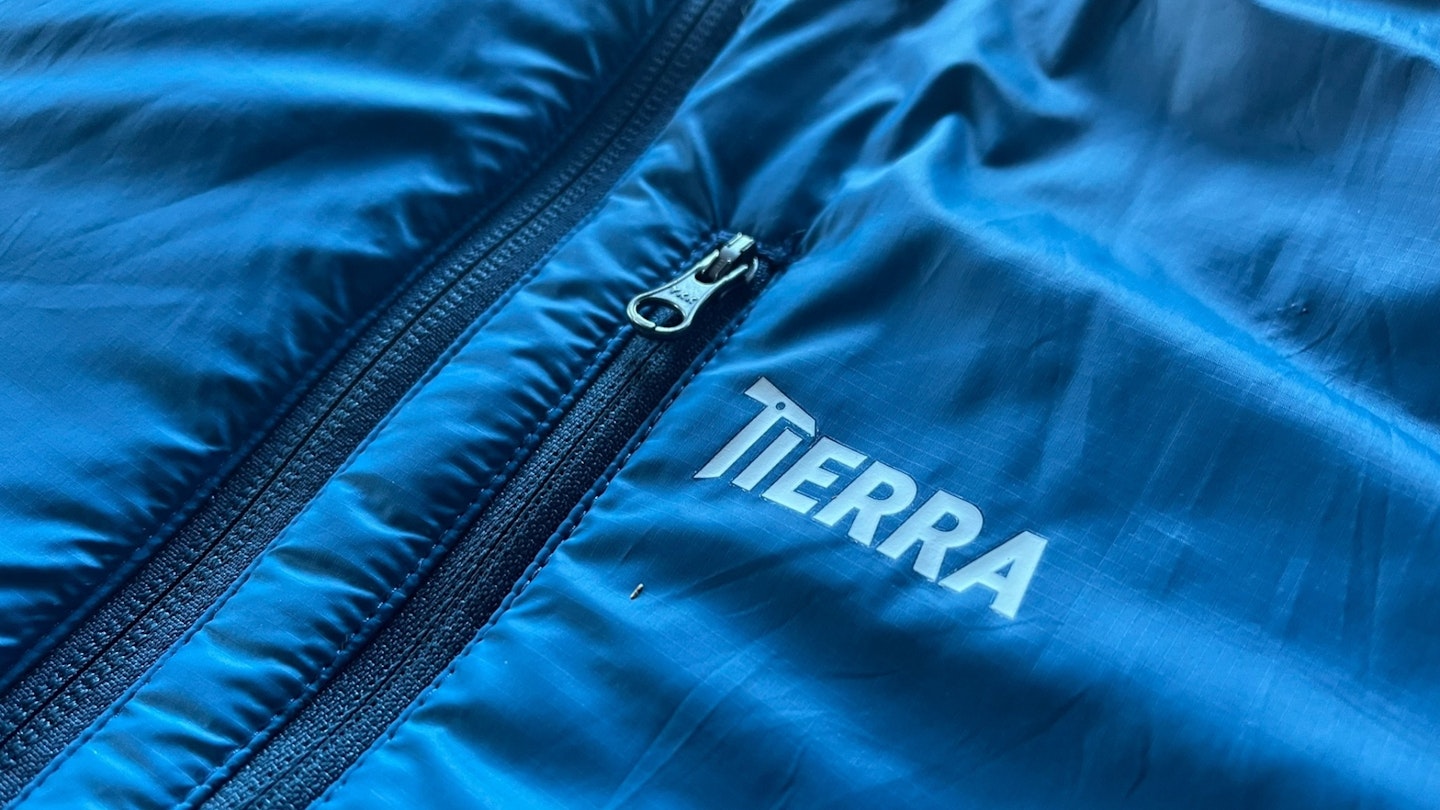
The shell of this jacket is made from lightweight ripstop nylon, as is the inner lining. Both are 100% recycled fabrics and finished with a PFC-free durable water repellent (DWR) treatment.
The fabric weight is specified as 38gsm but not the denier, though it feels like 20D nylon – so it ought to be fairly strong for its weight, able to stand up to everyday wear and tear. And another advantage of a block insulator like a belay jacket is that there are far fewer stitching seams compared to a baffled down puffer, which means you’re less likely to snag it.
The insulation is Lavalan Swedish wool in a 120gsm weight, consisting of 80% natural wool and 20% PLA (polylactic acid), a bio-polyester derived from corn starch. These are bonded together to create a practical fibrefill. It’s designed to be machine washable on a gentle wool cycle and a low spin (with suitable wool-friendly detergent).
Not that it should require frequent washing. Some of the many advantages of sheep’s wool are its breathability, temperature regulation and odour neutralisation, thanks to its naturally anti-bacterial properties. In addition, wool is a good insulator, due to its crimped fibres, which trap and holds warm air.
It also has less allergenic potential than down or feathers, whilst being a more sustainable and animal friendly alternative to synthetics, since it is renewable, recyclable and biodegradable. All in all, it’s an intriguing alternative to existing insulating fibres and seems to have a lot of potential.
Performance and comfort
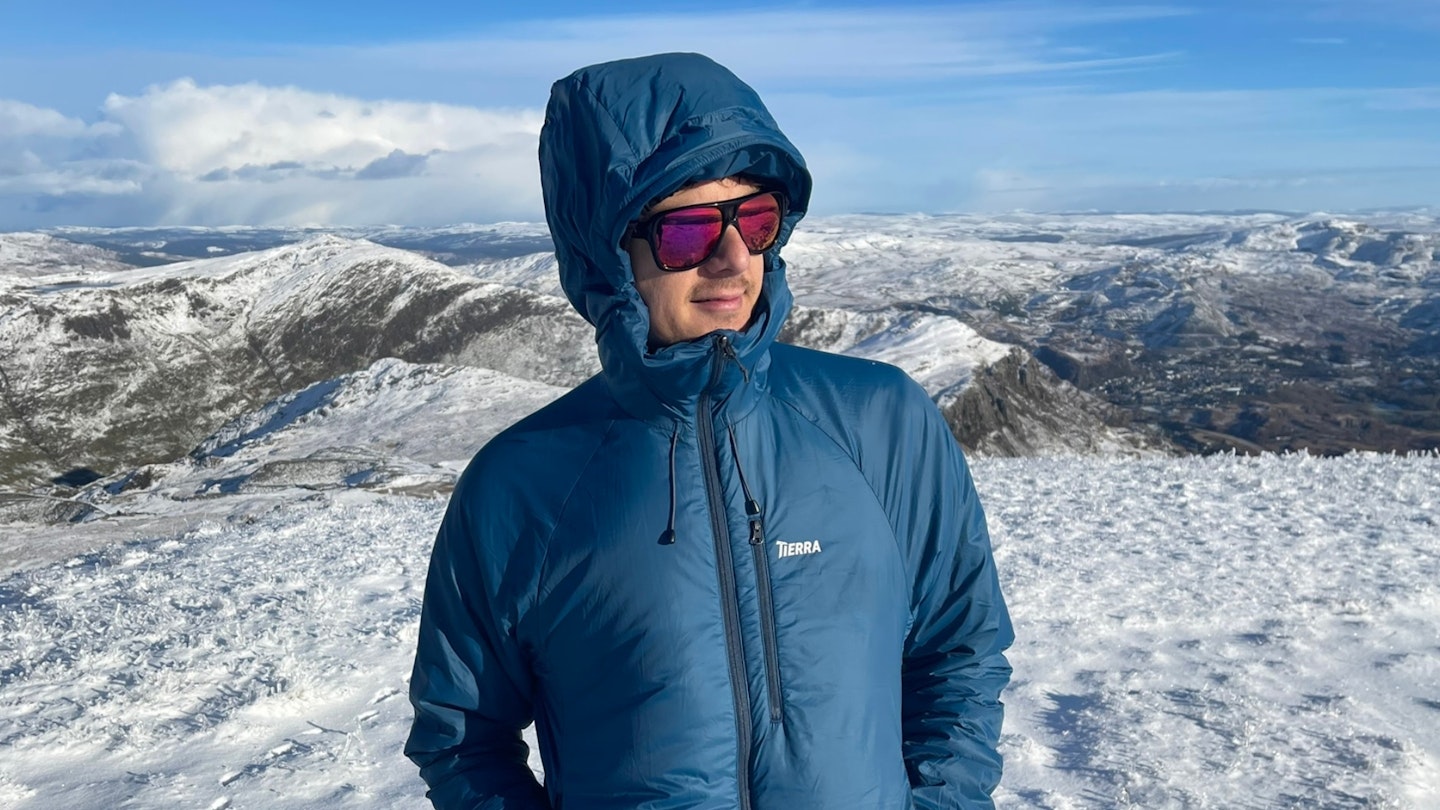
This jacket is very comfortable to wear, with a cosy yet protective feel thanks to its soft handle and full coverage fit. There’s plenty of length in the arms and body, being cut well below the hips with a dropped rear hem. The hood is fairly well-padded and cinches in nicely with three-point adjustment and a stiffened peak to help it hold its shape.
Elasticated cuffs and a drawcord hem mostly prevent any draughts from creeping in, while the hand pockets are lined with a super soft microfleece fabric.
There’s little not to like. Of course, in terms of warmth for weight, wool fill isn’t as thermally efficient as down or the highest-performing synthetics (there’s no getting around the fact that at a fibre level, wool is heavier than either a down filament or a strand of polyester).
But this is still a warm jacket, despite tipping the scales at a reasonable 490g (men’s M). I had this jacket out on test throughout November in the mountains of North Wales, when we got the first snow of the season. Temperatures in the hills hovered around -2°C, and got as low as -10°C once factoring in windchill.
The jacket handled these conditions well when layered with a midweight baselayer and fleece. The cut is accommodating enough to throw on over multiple layers and delivers a good level of warmth.
It’s also decently packable, which makes it a practicable extra layer for hillwalking, climbing, scrambling and wild camping. Only the most weight-conscious backpackers and mountaineers might think it too heavy or bulky.
Sustainability

This jacket scores well for sustainability, which is one of its major selling points. The ripstop nylon shell and lining are both made from 100% recycled fabric and finished with a PFC-free durable water repellent (DWR) treatment.
In addition, the fabric is Bluesign and Oeko-Tex approved and certified by the Global Recycling Standard. These are all industry-recognised sustainability standards. Meanwhile, the fill is made from Lavalan Swedish Wool in a 120gsm weight, consisting of 80% natural wool and 20% PLA, a bio-polyester.
The product itself in manufactured in Europe – Serbia, to be precise – which reduces the product’s overall carbon footprint for UK and EU consumers.
Tierra is part of Fenix Outdoor Group, which also owns brands such as Fjällräven, Hanwag and Royal Robbins, as well as UK retailer Trekitt. As part of that group, Tierra is a member of the Fair Labor Association (FLA), which conducts independent audits and evaluations of companies and production conditions.
Price and competition

There aren’t too many insulated jackets on the market using wool fill, though some of the specialist merino manufacturers such as Icebreaker, Isobaa and Mons Royale have experimented with the concept. These are mostly lightweight insulated midlayers though, rather than standalone jackets or parkas.
Fellow Swedish brand Fjallraven does make its Keb Wool Padded Jacket, which weighs 515g and costs £295. It is stuffed with 60gsm insulation, so it’s not as warm as the Tierra Belay 120, despite being considerably pricier. Nor is Salewa’s Ortles Hybrid Tirolwool Jacket (£230), another 60gsm wool fibrefill rival.
The only close competitor that I know of is Mountain Equipment’s Andola, which is a little lighter at 470g (men’s M), but not quite as warm (100gsm fill vs the Tierra’s 120gsm). It’s also more expensive, with a UK RRP of £250.
All in all, if you’re attracted by the idea of wool as an insulator and want to try it in a jacket that is decently warm, decently packable and well featured, this is – in my opinion – currently the best option on the market.
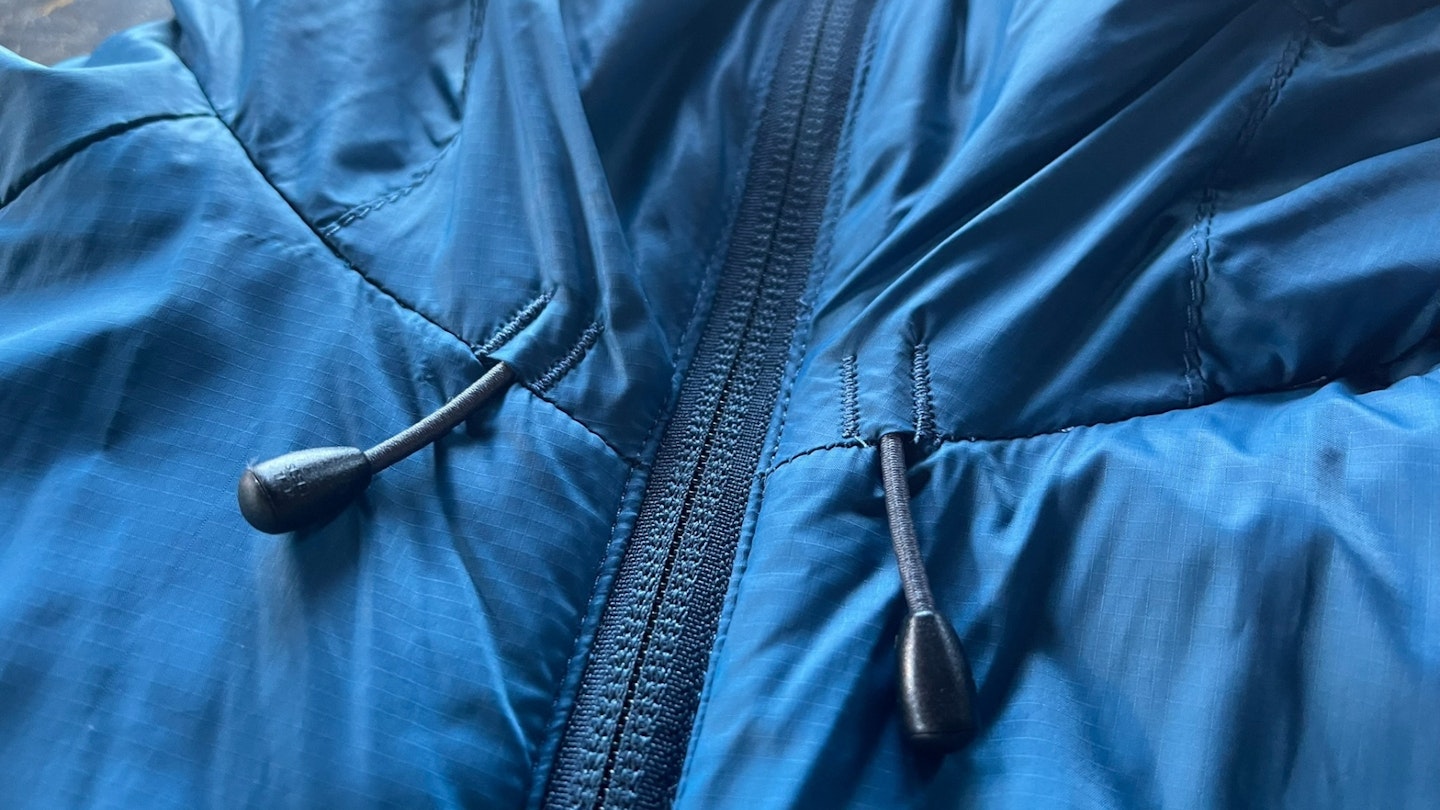
It also seems like very good value for the price point. It’s worth noting that Trekitt is the only UK retailer for the Tierra brand (they’re both part of the Fenix Outdoor Group), so it’s not worth shopping around.
Still, Trekitt is a well-established and highly regarded outdoor stalwart, with competitive pricing and a good customer rewards scheme. At time of writing, they also had this jacket in last season’s colourways on sale for £126, which is frankly a bargain.
If you’re not wedded to wool, then obviously a host of synthetic midweight belay jackets come into play at a similar price, or even a little lower. All will do the same job as the Tierra Belay 120, but arguably without the same eco credentials (though many now use recycled materials in their construction).
With a UK RRP of £180, the Sprayway Torridon Insulated Jacket is a stand-out product, which is why it’s my current best value pick in this category ahead of rivals like Alpkit’s 0Hiro (£200), the Mountain Equipment Shelterstone (£220) and the Keela Solo (£165).
Verdict
An intriguing alternative to the age-old down vs synthetic dilemma, this practical wool-filled midweight belay jacket is a great choice if you prefer natural fibres to man-made materials.
Shop this product
About the author

Matt Jones is a freelance journalist based in the heart of Snowdonia National Park, he’s a vastly experienced gear tester and self-confessed outdoor kit geek. Matt’s been one of our main gear testers for the last couple of years and is the first person we call with any complicated kit queries that need in-depth and forensic analysis.
